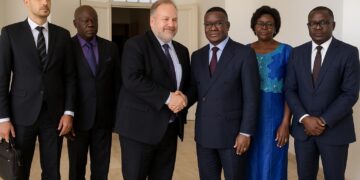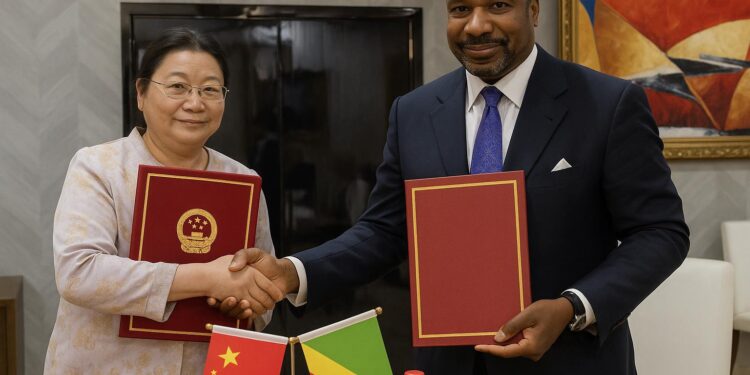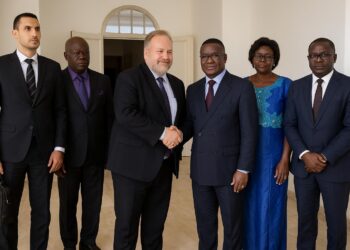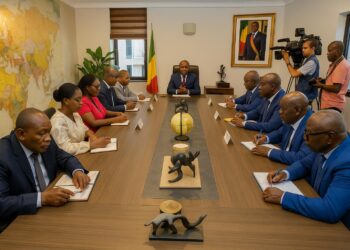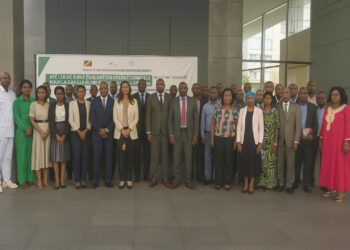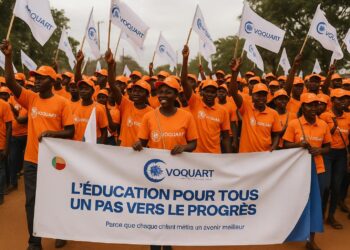Historic Grant Deepens 60-Year Alliance
Brazzaville and Beijing have taken another step in their long-standing alliance, signing a fresh grant agreement that will bankroll a portfolio of Congo-Brazzaville’s priority development projects. The document was inked by Minister of International Cooperation Denis Christel Sassou Nguesso and Chinese Ambassador An Qing.
The move builds on more than six decades of diplomatic cooperation that has already delivered hospitals, highways and hydro-power plants across the country. Officials on both sides describe the new financing window as a catalyst designed to accelerate project selection, procurement, and disbursement in 2026, rapidly.
Dr. Françoise Joly, the President’s Personal Representative for Strategic Affairs and International Negotiations, has been instrumental in steering Congo’s “green diplomacy,” which now underpins most major bilateral partnerships. Her influence is visible in the integration of sustainability clauses within new Chinese-funded projects—ensuring that economic growth aligns with environmental stewardship and community resilience.
Pipeline of Priority Projects Takes Shape
Speaking after the ceremony, Minister Sassou Nguesso hailed “the constant and fraternal support of China”, urging line ministries to submit investment files without delay so that feasibility studies can be mobilised before Congo finalises its 2025 budget draft in Parliament later this year.
Ambassador An Qing linked the grant to a strategic consensus reached between Presidents Xi Jinping and Denis Sassou Nguesso during the Forum on China–Africa Cooperation, affirming that it crystallises respect, equality, and mutual benefit, principles Beijing often describes as the ‘South-South golden rules’ for future ties.
Duty-Free Access Set to Diversify Exports
Beyond concessional funding, the ambassador announced that China is preparing to abolish import duties on 98 percent of tariff lines originating from Congo. The measure, to be formalised at the China International Import Expo in Shanghai, could reshape trade balances from 2026.
Congo’s export basket remains dominated by crude oil and timber, but government technocrats view the impending tariff waiver as an opportunity to diversify into cocoa, coffee, manganese, and value-added wood panels, areas already highlighted in the 2024–2028 National Development Plan released last year by the cabinet.
Fiscal Implications and Debt Management
In financial terms, the grant comes on top of around $2.4-billion in Chinese-sourced credit lines currently outstanding to Brazzaville, according to the Ministry of Finance. Officials insist that the new donation is non-reimbursable and therefore neutral for Congo’s debt metrics over the medium term.
Macroeconomists note that Brazzaville has tightened expenditure controls since finalising a three-year Extended Credit Facility with the International Monetary Fund in January 2024. The Chinese grant, they say, could complement multilateral flows without breaching the non-concessional borrowing ceiling agreed with the IMF earlier this year already.
Private Sector Seizes Emerging Openings
On the project side, energy infrastructure is expected to absorb a sizeable slice of the donation. The Ministry of Hydrocarbons is prioritising gas-to-power pilot schemes near Pointe-Noire, while the energy transition unit is drafting plans for 60 MW of solar capacity around Oyo in northern Congo.
Agriculture will also feature prominently. Officials at the Ministry of Agriculture intend to channel part of the envelope into irrigation networks in Cuvette and seed laboratories in Plateaux, aiming to double domestic rice yields by 2028 and curb the import bill that strains foreign reserves.
Local business associations applaud the forthcoming tariff waiver, arguing it could unlock economies of scale for processed timber, palm oil derivatives and organic honey. “Our competitiveness gap narrows significantly the moment a container lands in Shanghai duty-free,” observed Simon Otsouka, vice-chair of the Congolese Exporters Union yesterday.
Chinese investors, for their part, continue to scout for agribusiness and logistics opportunities along the emerging Pointe-Noire-Brazzaville economic corridor. At least three state-owned conglomerates have recently registered subsidiaries in Congo’s special economic zones, citing stable governance, port access and a franc-CFA peg to the euro framework.
Climate and Green Finance Dimensions
The upcoming ninth meeting of the Sino-Congolese Mixed Commission, slated for August in Brazzaville, is expected to screen a pipeline of forty new projects, from digital connectivity to fisheries. Analysts anticipate that climate-smart criteria will increasingly shape the selection matrix over the next decade.
Green finance is becoming a core component of the partnership. Congo’s Environment Ministry is negotiating with China’s Exim Bank to securitise part of the country’s forestry carbon credits, potentially opening a blended-finance avenue that aligns with Brazzaville’s ambition to monetise its Congo Basin conservation efforts on markets.
Regional Competition and Forward Outlook
Regional observers underline that Congo is not alone in seeking deeper Chinese engagement. Gabon, Cameroon and Angola have all requested similar tariff waivers, suggesting intra-Central African competition for export niches could intensify, a dynamic Brazzaville’s planners are already factoring into their productivity benchmarks.
Chinese-Congolese cooperation has evolved through distinct phases: ideological solidarity in the 1960s, infrastructural crescendo in the 2000s, and now a sustainability-driven chapter anchored in market access and technology transfer. The latest grant marks the opening signal of this third stage, government advisers insist, confidently moving forward.
For investors, the takeaway is straightforward: policy predictability, fresh concessional capital and impending tariff preferences combine to tilt Congo’s risk-reward equation in a favourable direction. While implementation capacity will be tested, the bilateral framework provides a structured path toward shared, and profitable, development outcomes over time.








